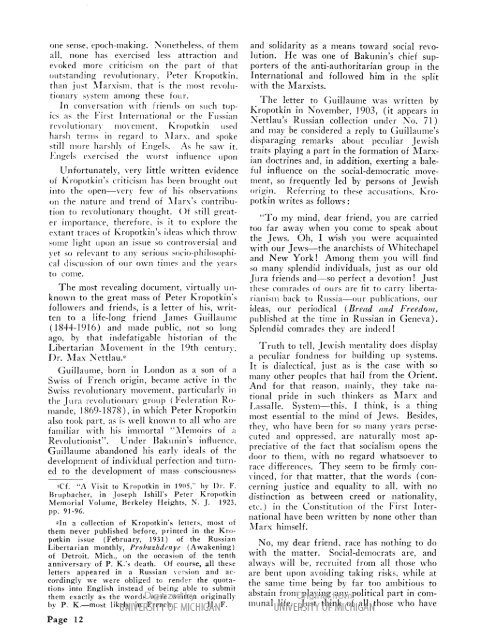Centennial Expressions on Peter Kropotkin 1842-1942.
Centennial Expressions on Peter Kropotkin 1842-1942.
Centennial Expressions on Peter Kropotkin 1842-1942.
You also want an ePaper? Increase the reach of your titles
YUMPU automatically turns print PDFs into web optimized ePapers that Google loves.
<strong>on</strong>e sense, epoch-making. N<strong>on</strong>etheless, of them<br />
all, n<strong>on</strong>e has exercised less attracti<strong>on</strong> and<br />
evoked more criticism <strong>on</strong> the part of that<br />
outstanding revoluti<strong>on</strong>ary, <strong>Peter</strong> <strong>Kropotkin</strong>,<br />
than just Marxism, that is the most revoltiti<strong>on</strong>ary system am<strong>on</strong>g these four.<br />
In c<strong>on</strong>versati<strong>on</strong> with friends <strong>on</strong> such topics as the First Internati<strong>on</strong>al or the Fussian<br />
revoluti<strong>on</strong>ary movement, <strong>Kropotkin</strong> usedt<br />
harsh termns in regard to Mlarx, and spoke<br />
still more harshly of Engels. As he saw it.<br />
Engels exercised the \worst influence up<strong>on</strong><br />
Unfortunately, very little written evidence<br />
of <strong>Kropotkin</strong>'s criticism has been brought out<br />
into the open-very few<br />
of his observati<strong>on</strong>s<br />
<strong>on</strong> the nature and trend of Marx's c<strong>on</strong>tributi<strong>on</strong> to revoluti<strong>on</strong>ary thought. Of still greater importance, therefore, is it to explore the<br />
extant traces of <strong>Kropotkin</strong>'s ideas which throw<br />
some light up<strong>on</strong> an issue so c<strong>on</strong>troversial and<br />
vet so relevant to any serious socio-philosophical discussi<strong>on</strong> of our own times andl the years<br />
to colme.<br />
The most revealing document, virtually utnknown to the great mass of <strong>Peter</strong> <strong>Kropotkin</strong>'s<br />
followers and friends, is a letter of his, written to a life-l<strong>on</strong>g friend James Guillaume<br />
(1844-1916) and made public, not so l<strong>on</strong>g<br />
ago, by that indefatigable historian of the<br />
Libertarian Movement in the 19th century,<br />
Dr. Max Nettlau.2<br />
Guillaume, born in L<strong>on</strong>d<strong>on</strong> as a s<strong>on</strong> of a<br />
Swiss of French origin, became active in the<br />
Swiss revoluti<strong>on</strong>ary movement, particularly in<br />
the Jura revoluti<strong>on</strong>ary group ( Federati<strong>on</strong> Romande, 1869-1878), in which <strong>Peter</strong> <strong>Kropotkin</strong><br />
also took part, as is well known to all who are<br />
familiar with his immortal "Memoirs of a<br />
Revoluti<strong>on</strong>ist". Under Bakunin's influence,<br />
Guillaume aband<strong>on</strong>ed his early ideals of the<br />
development of individual perfecti<strong>on</strong> and turned to the development of mass c<strong>on</strong>sciousness,Cf. "A Visit to <strong>Kropotkin</strong> in 1905," by Dr. F.<br />
Brupbacher, in Joseph Ishill's <strong>Peter</strong> <strong>Kropotkin</strong><br />
Memorial Volume, Berkeley Heights, N. J. 1923,<br />
pp. 91-96.<br />
21n a collecti<strong>on</strong> of <strong>Kropotkin</strong>'s letters, most of<br />
them never published before, printed in the Kropolkin issue (February, 1931) of the Russian<br />
Libertarian m<strong>on</strong>thly, Probuzhdenye (Awakening)<br />
of Detroit, Mich., <strong>on</strong> the occasi<strong>on</strong> of the tenth<br />
anniversary of P. K.'s death. Of course, all these<br />
letters appeared in a Russian versi<strong>on</strong> and accordingly we were obliged to render the quotati<strong>on</strong>s into English instead of being able to submit<br />
them exactly as the words were written originally<br />
by P. K.-most likely in French. H. F.<br />
Page 12<br />
and solidarity as a means toward social revoluti<strong>on</strong>. He was <strong>on</strong>e of Bakunin's chief supporters of the anti-authoritarian group in the<br />
Internati<strong>on</strong>al and followed him in the split<br />
with the Marxists.<br />
The letter to Guillaume was written by<br />
<strong>Kropotkin</strong> in November, 1903, (it appears in<br />
Nettlau's Russian collecti<strong>on</strong> under No. 71)<br />
and may be c<strong>on</strong>sidered a reply to Guillaume's<br />
disparaging remarks about peculiar Jewish<br />
traits playing a part in the formati<strong>on</strong> of Marxian doctrines and, in additi<strong>on</strong>, exerting a baleful influence <strong>on</strong> the social-democratic movement, so frequently led by pers<strong>on</strong>s of Jewish<br />
origin. Referring to these acctisati<strong>on</strong>s, <strong>Kropotkin</strong> writes as follows:<br />
"To my mind, dear friend, you are carried<br />
too far away when you come to speak about<br />
the Jews. Oh, I wish you were acquainted<br />
with our Jews-the anarchists of Whitechapel<br />
and New York! Am<strong>on</strong>g them you will find<br />
so many splendid individuals, just as our old<br />
Jura friends and-so perfect a devoti<strong>on</strong>! Just<br />
these comrades of ours are fit to carry libertarian ism back to Rutssia--our publicati<strong>on</strong>s, our<br />
ideas, our periodical (Bread and Freedom,<br />
published at the time in Russian in Geneva).<br />
Splendid comrades they are indeed!<br />
Truth to tell, Jewish mentality does display<br />
a peculiar f<strong>on</strong>dness for building up systems.<br />
It is dialectical, just as is the case with so<br />
many other peoples that hail from the Orient.














![The Philosophy of Progress [pdf]](https://img.yumpu.com/14077359/1/190x245/the-philosophy-of-progress-pdf.jpg?quality=85)

